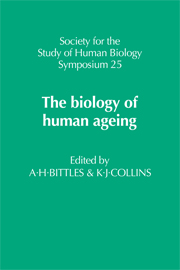Book contents
- Frontmatter
- Contents
- Preface
- Ageing as a consequence of natural selection
- Genetic information in ageing cells
- Insects as models for testing theories of ageing
- Human cell culture systems in the study of ageing
- Estimation of biological maturity in the older child
- Biological age assessment in adulthood
- Skeletal age and palaeodemography
- Cell death and the loss of structural units of organs
- The prospects for mortality decline and consequent changes in age structure of the population
- Where do old people come from? An evaluation of American population projections
- Age structure of Soviet population in the Caucasus: facts and myths
- The health of an ageing population
- Can we tell our age from our biochemistry?
- Dietary manipulation of ageing: an animal model
- Customary physical activity in the elderly
- Effects of ageing on human homeostasis
- Index
Dietary manipulation of ageing: an animal model
Published online by Cambridge University Press: 06 August 2010
- Frontmatter
- Contents
- Preface
- Ageing as a consequence of natural selection
- Genetic information in ageing cells
- Insects as models for testing theories of ageing
- Human cell culture systems in the study of ageing
- Estimation of biological maturity in the older child
- Biological age assessment in adulthood
- Skeletal age and palaeodemography
- Cell death and the loss of structural units of organs
- The prospects for mortality decline and consequent changes in age structure of the population
- Where do old people come from? An evaluation of American population projections
- Age structure of Soviet population in the Caucasus: facts and myths
- The health of an ageing population
- Can we tell our age from our biochemistry?
- Dietary manipulation of ageing: an animal model
- Customary physical activity in the elderly
- Effects of ageing on human homeostasis
- Index
Summary
INTRODUCTION
Disease becomes more common with increasing age. Changes in connective tissue associated with the ageing process hastens degeneration of the vasculature leading to increasing cardio- and cerebro-vascular disease with age. As the internal organs function less efficiently with age, alterations in hormone levels and changes in the immune system lead to an increase in endocrine disorders, bone fragility and infectious disease in later life. Most cancers also are commoner in the elderly. The reason for this is not clear, but as life expectancy increases so does the incidence of cancer. Moreover, modern therapeutics allows many conditions to be treated well into the seventh and eighth decade to the extent that it is now often difficult to know what primary cause of death to put on the certificate of a recently decreased octogenarian.
At the BUPA Medical Centre we have been carrying out routine health screening for the last ten years. This paper presents data on biochemical constituents of blood and the changes that are seen in different age groups.
HEALTH SCREENING
The object of health screening is to detect disease at a ‘sub-clinical’ or a ‘pre-symptomatic’ phase in the belief that it will be more amenable to treatment at an early stage rather than at a late one (Beric Wright & Bailey, 1982). However, the majority of subjects attending a screening centre do not have overt disease and their characteristics can be used to study the relationship of age, among other factors, to the levels of various physiological and biochemical measurements. Four patterns of biochemical change associated with age are presented.
- Type
- Chapter
- Information
- The Biology of Human Ageing , pp. 223 - 242Publisher: Cambridge University PressPrint publication year: 1986
- 4
- Cited by

